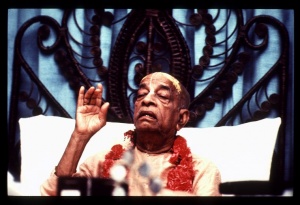CC Madhya 14.187: Difference between revisions
m (1 revision(s)) |
No edit summary |
||
| Line 1: | Line 1: | ||
{{ | [[Category:Sri Caitanya-caritamrta - Madhya-lila Chapter 14|C187]] | ||
<div style="float:left">'''[[Sri Caitanya-caritamrta|Śrī Caitanya-caritāmṛta]] - [[CC Madhya|Madhya-līlā]] - [[CC Madhya 14|Chapter 14: Performance of the Vṛndāvana Pastimes]]'''</div> | |||
<div style="float:right">[[File:Go-previous.png|link=CC Madhya 14.186|Madhya-līlā 14.186]] '''[[CC Madhya 14.186|Madhya-līlā 14.186]] - [[CC Madhya 14.188|Madhya-līlā 14.188]]''' [[File:Go-next.png|link=CC Madhya 14.188|Madhya-līlā 14.188]]</div> | |||
{{CompareVersions|CC|Madhya 14.187|CC 1975|CC 1996}} | |||
{{RandomImage}} | |||
==== TEXT 187 ==== | ==== TEXT 187 ==== | ||
<div | <div class="verse"> | ||
gati-sthānāsanādīnāṁ | :gati-sthānāsanādīnāṁ | ||
mukha-netrādi-karmaṇām | :mukha-netrādi-karmaṇām | ||
tātkālikaṁ tu vaiśiṣṭyaṁ | :tātkālikaṁ tu vaiśiṣṭyaṁ | ||
vilāsaḥ priya-saṅga-jam | :vilāsaḥ priya-saṅga-jam | ||
</div> | </div> | ||
| Line 14: | Line 18: | ||
==== SYNONYMS ==== | ==== SYNONYMS ==== | ||
<div | <div class="synonyms"> | ||
''gati''—moving; ''sthāna''—standing; ''āsana-ādīnām''—and of sitting and so on; ''mukha''—or the face; ''netra''—of the eyes; ''ādi''—and so on; ''karmaṇām—''of the activities; ''tāt-kālikam''—relating to that time; ''tu''—then; ''vaiśiṣṭyam—''various symptoms; ''vilāsaḥ—''of the name ''vilāsa; priya-saṅga-jam''—produced from meeting her beloved. | |||
</div> | </div> | ||
| Line 21: | Line 25: | ||
==== TRANSLATION ==== | ==== TRANSLATION ==== | ||
<div | <div class="translation"> | ||
"'The various symptoms manifested in a woman’s face, eyes and the other parts of her body and the way she moves, stands or sits when she meets her beloved are called vilāsa.'" | |||
</div> | </div> | ||
__NOTOC__ | |||
<div style="float:right; clear:both;">[[File:Go-previous.png|link=CC Madhya 14.186|Madhya-līlā 14.186]] '''[[CC Madhya 14.186|Madhya-līlā 14.186]] - [[CC Madhya 14.188|Madhya-līlā 14.188]]''' [[File:Go-next.png|link=CC Madhya 14.188|Madhya-līlā 14.188]]</div> | |||
__NOTOC__ | |||
__NOEDITSECTION__ | |||
Revision as of 15:01, 1 September 2021

His Divine Grace
A.C. Bhaktivedanta Swami Prabhupada
A.C. Bhaktivedanta Swami Prabhupada
TEXT 187
- gati-sthānāsanādīnāṁ
- mukha-netrādi-karmaṇām
- tātkālikaṁ tu vaiśiṣṭyaṁ
- vilāsaḥ priya-saṅga-jam
SYNONYMS
gati—moving; sthāna—standing; āsana-ādīnām—and of sitting and so on; mukha—or the face; netra—of the eyes; ādi—and so on; karmaṇām—of the activities; tāt-kālikam—relating to that time; tu—then; vaiśiṣṭyam—various symptoms; vilāsaḥ—of the name vilāsa; priya-saṅga-jam—produced from meeting her beloved.
TRANSLATION
"'The various symptoms manifested in a woman’s face, eyes and the other parts of her body and the way she moves, stands or sits when she meets her beloved are called vilāsa.'"